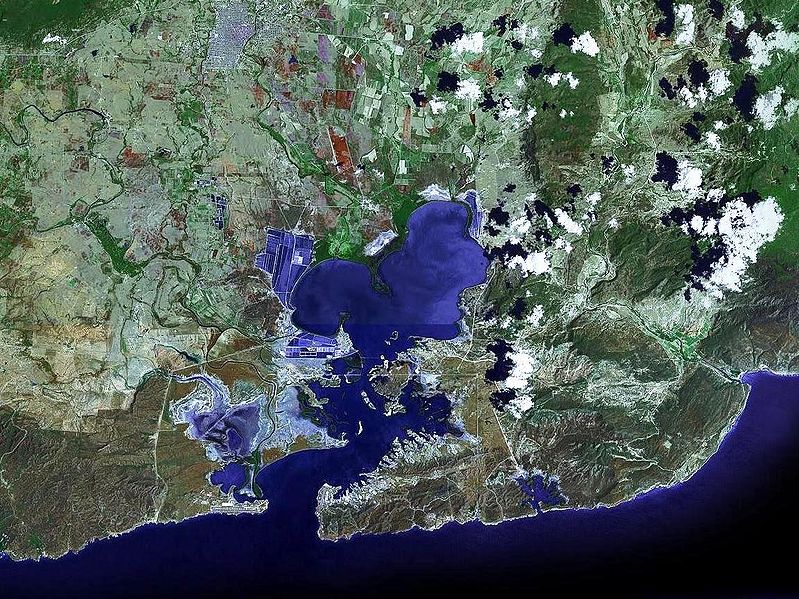US Should Give Up Guantanamo to Cuba

A decent article here with a terribly skewed headline on the way Guantanamo Bay is viewed by Cuba... from the eyes of US Cuba watchers. Apparently finding any official Cuban position on the island was not possible for this reporter. All it took me was a few seconds on the Fidel Castro speech database to find countleess clear statements like this to Clinton in 94:
"I was thinking that if it is true that they -- as they say want to establish a more mature relationship and withdraw their bases from Latin America, they must not forget to close the Guantanamo base."
Yes it is true that Cuba has higher ranked problems with the US than Guantanamo. But to argue Cuba secretly likes having the "most dangerous people the the world" occupied by the Americans on their soil is pure fiction
Guantanamo not that high on Cuba's wish list
Even as it is rankled by the U.S. troop presence, Havana may find the base serves a better purpose as a symbol of American hegemony.
By Carol J. Williams, Times Staff Writer
April 18, 2007
GUANTANAMO BAY, CUBA — Fidel Castro wages silent protest against the U.S. military "tenants" of this bay in southern Cuba from a drawer in his desk.
There lie 47 uncashed checks drawn on the U.S. Treasury, each for $4,085, the annual rent fixed in a 1903 lease agreement that has vexed the Cuban leader since a leftist revolution brought him to power nearly half a century ago.
The presence of U.S. troops on Cuban soil has long rankled Castro, who, before taking ill in July and temporarily ceding presidential authority to his brother Raul, often ranted about the "imperialist occupation" in speeches and broadcasts.
...
In a report issued last month on Guantanamo's role in the troubled diplomatic relationship between Havana and Washington, the Council on Hemispheric Affairs think tank concluded that returning the territory to Cuba would be essential to ending the United States' perceived domination of Latin American neighbors.
During President Bush's trip last month through Latin America, even friendly leaders reminded him of the message conveyed to the region by U.S. military occupation of the Cuban territory, said the council's director, Larry Birns.
"Guantanamo is the symbol of 19th century gunboat diplomacy practiced by Washington," Birns said. He added that a movement was gaining ground throughout the Western Hemisphere "questioning the United States' legitimacy in occupying Guantanamo under the present arrangement."
...
The U.S. government gained control of Guantanamo Bay and its surrounding territory in 1903 under an agreement between the newly independent Cuban government and its U.S. liberators after the 1898 Spanish-American War.
At the time, the military wanted a base to position U.S. forces to protect the Panama Canal, then under construction. The base also played an important role during the Cold War, allowing U.S. forces to monitor Soviet movements in the region.
But since the 1991 demise of the Soviet Union and its communist empire and the 1999 return of the Panama Canal to its host nation, the U.S. base has lost its strategic significance and now serves as little more than "a colonial relic," Birns asserted.
The 103-year-old agreement limits use of the Cuban territory to "coaling and naval purposes only," neither of which appears to cover the prison or tribunal operations.
The agreement also expressly prohibits "commercial, industrial or other enterprise within said areas," but the U.S. base now sports a McDonald's, two Starbucks outlets, a Subway sandwich shop and other American concessions.
Such breaches of the treaty render it voidable, the Council on Hemispheric Affairs stated in its report urging the U.S. government to cease its use of Guantanamo against the host country's wishes.
Although U.S. Defense Secretary Robert M. Gates and Secretary of State Condoleezza Rice have publicly acknowledged that many foreign allies view the detention center and war crimes tribunal as illegitimate, some U.S. officials argue that the base remains crucial to American interests in the region.
Whole thing
Labels: cuba guantanamo us coha

0 Comments:
Post a Comment
Subscribe to Post Comments [Atom]
<< Home